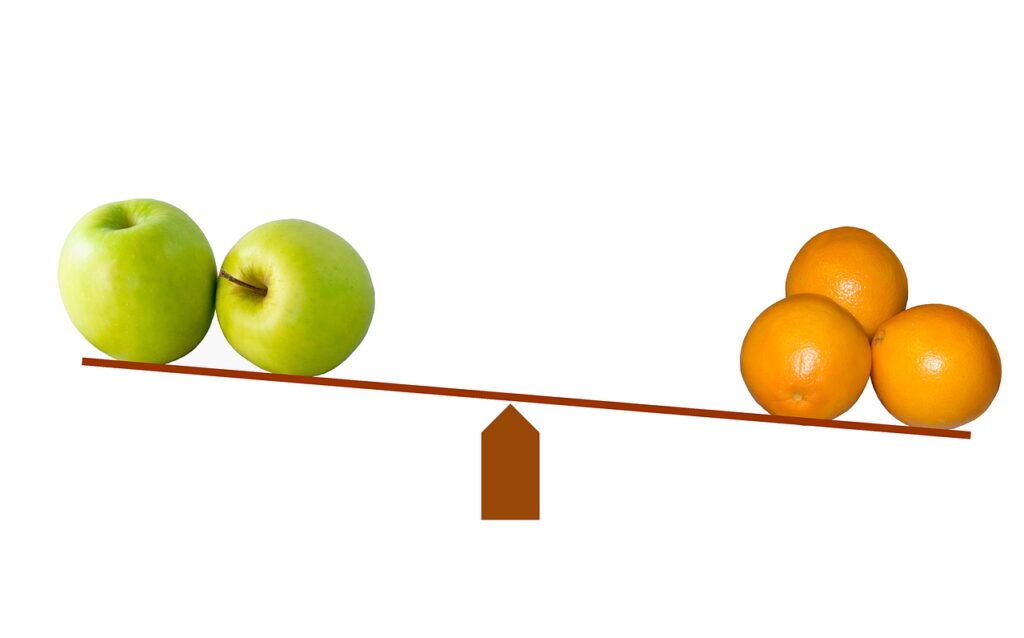Want to learn how to escape the comparison trap in a world dominated by social media, when it’s all too easy to fall into the comparison trap? Well, keep on reading because that’s exactly what we aim to do with our 11 practical tips on how to stop comparing ourselves to others.

We often find ourselves measuring our worth against the seemingly perfect lives of others, leading to feelings of inadequacy, low self-esteem, and even anxiety.
Escaping this cycle is essential for our mental well-being and personal growth.
In this article, we will discuss strategies to overcome the comparison trap and develop a positive outlook toward ourselves and our achievements.
Understanding the Comparison Trap
In today’s interconnected world, it’s nearly impossible to avoid exposure to the achievements and lifestyles of others.
The constant barrage of carefully curated images and stories can lead us to compare ourselves, often unfairly, to others.
This comparison trap undermines our self-worth and hinders our ability to appreciate our own journey.
The Negative Effects of Constant Comparison

Constant comparison can lead to a range of negative emotions such as jealousy, insecurity, and unhappiness.
It shifts our focus away from our own accomplishments and progress, making us overlook the unique qualities that define us.
This cycle of constant comparison can have profound psychological and emotional effects on our well-being.
The feelings of jealousy that arise from comparing ourselves to others can create a toxic mindset, where we believe that others’ achievements diminish our own worth.
This can lead to a sense of inadequacy, as we constantly measure ourselves against unrealistic standards.
Moreover, the incessant comparison also erodes our self-esteem. When we constantly focus on what we lack or what others have, we neglect to appreciate our own journey and personal growth.
It becomes easy to downplay our accomplishments and unique qualities, as they seem insignificant compared to the perceived successes of others.
This not only robs us of self-confidence but also prevents us from cultivating a positive self-image.
Escaping the grip of these negative effects requires conscious effort and a shift in perspective. By recognizing the detrimental impact of constant comparison and consciously redirecting our focus to our own growth and uniqueness, we can begin to break free from this harmful cycle.
So let’s check out 11 tips on how to escape the comparison trap:
1. Embrace Your Uniqueness

Each person possesses unique talents, experiences, and attributes. Embracing these qualities and acknowledging that everyone’s journey is unique is crucial to breaking free from the comparison trap.
Our journey through life is shaped by a multitude of factors that are entirely unique to us. The combination of our experiences, skills, passions, and challenges forms a narrative that cannot be replicated by anyone else.
When we embrace our uniqueness, we open the door to self-acceptance and self-love.
Recognizing that there is no one-size-fits-all definition of success or fulfillment is liberating. Our worth isn’t defined by external achievements or how closely we match someone else’s path.
It’s about understanding and celebrating our individuality, and acknowledging that our value comes from within.
By recognizing our uniqueness, we gain the power to create our own path & make choices that fit our true selves. This voyage is a celebration of who we are & what we can accomplish, and allows to escape the comparison trap.
2. Escape the Comparison Trap: Set Personal Goals

Setting and achieving personal goals allows us to focus on our growth rather than on what others are doing. Small achievements contribute to a sense of accomplishment that’s independent of external comparisons.
Goals serve as powerful motivators that drive us towards growth and self-improvement. When we set achievable objectives that are aligned with our values and aspirations, we create a roadmap for our own success.
This roadmap is unique to us and doesn’t rely on external factors or comparisons to validate its significance.
Breaking down larger goals into smaller, actionable steps provides a sense of accomplishment with each milestone reached.
This sense of achievement is not tied to how we measure up against others but rather to our personal progress and development.
Moreover, setting personal goals cultivates a growth mindset. Instead of fixating on what we lack compared to others, we focus on our potential and our ability to continuously evolve.
This shift in perspective encourages a positive relationship with ourselves and our capabilities, allowing us to celebrate every step forward, no matter how small.
Investing in our own journey and growth by setting personal goals prioritizes our unique aspirations over external pressures of comparison.
3. Practice Gratitude

Gratitude helps us see what we have instead of what we lack, reducing the negative effects of comparison.
Gratitude is a transformative practice that helps us realign our perspective and find contentment in the present moment.
It encourages us to pause and reflect on the blessings and positive aspects of our lives, which often go unnoticed when we’re consumed by comparison.
In the context of the comparison trap, gratitude acts as a shield against feelings of inadequacy and jealousy.
When we shift our attention from what we lack to what we’ve already achieved and have, we begin to realize the abundance that surrounds us.
Cultivating a gratitude practice involves regularly acknowledging and appreciating the small joys and victories in our lives.
This practice isn’t about ignoring challenges or denying the existence of hardships; rather, it’s about maintaining a balanced perspective and not allowing comparison to overshadow our blessings.
Check out our article of over 100+ Things to Be Grateful For.
4. Cultivate Self-Compassion

Treating ourselves with self-compassion fosters self-love and acceptance.
Self-compassion means treating ourselves with the same kindness, care, and empathy we give to others. It involves recognizing our flaws and struggles without self-judgment or criticism.
In the context of the comparison trap, self-compassion acts as a powerful antidote to the feelings of inadequacy that arise when we measure ourselves against others.
Instead of berating ourselves for not living up to certain standards, we treat ourselves with the same kindness we would a friend who’s facing challenges.
This practice cultivates a sense of self-love and self-acceptance. When we embrace our flaws and acknowledge our humanity, we create a safe space to learn and grow.
Self-compassion doesn’t equate to complacency; rather, it paves the way for meaningful self-improvement.
Cultivating self-compassion requires practicing self-kindness, acknowledging our shared human experience, and letting go of the unrealistic standards we impose on ourselves.
Breaking free from the cycle of self-comparison and fostering a healthier relationship with ourselves can be achieved by treating ourselves with the same care we offer others.
5. Limit Social Media Exposure

While social media can be a valuable tool for connection and inspiration, it can also contribute to the comparison trap when not used mindfully.
The carefully curated content we see often showcases the highlight reels of others’ lives, which can lead to feelings of inadequacy and envy.
Limiting social media exposure involves setting boundaries on the amount of time spent scrolling through feeds. Designate specific times for checking social media, and avoid mindlessly scrolling during idle moments.
Most social media apps such as Instagram have a setting that allows you to put a time limit on the time you spend on the said app every day. When time is up, a notification will appear on your screen telling you that you have consumed your allocated time for the day and that it’s time to close the app.
Of course, you need the discipline to actually close it, and not just keep on scrolling (I’m guilty of doing this sometimes).
This approach reduces the chances of stumbling upon triggering content that fosters comparison.
Empower yourself by controlling social media use for well-being and growth, rather than succumbing to negative comparison effects.
6. Focus on Personal Growth

Instead of comparing ourselves to others, focusing on personal growth empowers us to measure success by our progress, regardless of external factors.
Personal growth is a lifelong journey that’s unique to each individual. It involves continuous learning, self-improvement, and the pursuit of becoming the best version of ourselves.
When we prioritize personal growth over external comparisons, we create a path that’s defined by our own aspirations and values.
Focusing on personal growth shifts our perspective from competition to collaboration. Instead of viewing others as rivals, we see them as fellow travelers on the journey of self-discovery.
This perspective encourages us to celebrate others’ achievements while still remaining committed to our own development.
Moreover, personal growth is not limited to specific achievements or milestones. It encompasses various aspects of our lives, including emotional well-being, relationships, and self-awareness.
Recognizing progress fosters a fulfilling sense of achievement, free from external standards.
Opting for personal growth means accepting things that you can’t change, seeking challenges, embracing change, and expanding your comfort zones.
It involves pursuing growth aligned with passions and values, irrespective of others’ paths.
Continue reading to find out 5 more tips on how to stop comparing yourself to others:
7. Surround Yourself with Positivity

Surrounding ourselves with supportive and positive individuals who celebrate our successes can reinforce our self-esteem and diminish the impact of comparisons.
The people we surround ourselves with play a significant role in shaping our mindset and self-perception.
Positive relationships provide a supportive network that encourages us to be our authentic selves and celebrates our achievements, no matter how small.
When we’re in the company of those who uplift us, we’re more likely to view our accomplishments with pride and satisfaction.
Supportive individuals remind us of our strengths and unique qualities, helping us build a strong foundation of self-esteem that’s resilient against comparison.
These relationships also remind us that we’re not alone in our experiences. Sharing our challenges and triumphs with others fosters connection and empathy, making it easier to navigate the feelings of inadequacy that can arise from comparison.
Cultivating positive relationships involves seeking out individuals who share our values and positively contribute to our growth.
These connections create a sense of belonging and affirmation that counteracts the negative impact of constant comparison.
8. Redirect Your Energy to Creativity

Engaging in creative pursuits allows us to channel our energy into something productive and fulfilling. Creativity nurtures self-expression and self-discovery.
Creativity is a powerful outlet for self-expression and self-discovery. Engaging in creative activities allows us to tap into our inner thoughts, emotions, and ideas, providing an avenue for self-expression that’s unique to each individual.
When we immerse ourselves in creative pursuits, we redirect our focus from external comparisons to the joy of creation.
Whether it’s painting, writing, playing an instrument, or crafting, creativity allows us to channel our energy into something that’s personally meaningful and fulfilling.
Additionally, creativity promotes a sense of autonomy and ownership over our accomplishments. When we create something, we’re the authors of our work, independent of external standards or comparisons.
This sense of ownership contributes to a strong sense of self-worth and accomplishment.
Exploring creativity isn’t about perfection or comparison. It’s embracing the process, embracing mistakes, and enjoying self-discovery. Creative engagement sidesteps comparison, prioritizing personal growth and expression.
9. Overcome the Fear of Failure

The fear of not measuring up often stems from a fear of failure. By reframing failure as a learning opportunity, we can escape the comparison trap and pursue our goals fearlessly.
Failure is an integral part of any journey toward success and growth. The fear of failure often stems from the belief that not meeting specific standards equates to inadequacy or worthlessness.
However, reframing failure as a valuable learning experience empowers us to shift our perspective and transcend the comparison trap.
When we view failure as a stepping stone rather than a dead end, we free ourselves from the constraints of perfectionism and external judgments.
Every obstacle presents a chance to gain knowledge, adjust, and enhance oneself.
Embracing this mindset allows us to pursue our goals with resilience and determination, regardless of how our progress compares to others.
In fact, failure can lead to some of the most profound personal growth. It forces us to examine our approach, identify areas for improvement, and develop resilience in the face of adversity.
By accepting failure as a natural part of the journey, we escape from the comparison trap and concentrate on our individual progress and development.
10. Seeking Professional Help

If comparing your situation to others is seriously affecting your mental well-being, consulting a therapist or counselor can offer strategies to manage these emotions successfully.
Recognizing the significant impact of constant comparison on mental health is crucial. If comparison triggers feelings of depression, anxiety, or low self-esteem, seeking professional help can be a transformative step toward healing.
Therapists and counselors are trained to provide personalized strategies for managing and overcoming the negative effects of comparison.
They can help you explore the root causes of these feelings, develop coping mechanisms, and foster a healthier relationship with yourself and others.
Professional support also offers a safe space to discuss and process your emotions. A therapist can help you challenge negative thought patterns, develop self-compassion, and build resilience in the face of comparison triggers.
Remember, seeking help is a sign of strength, not weakness.
It’s a proactive step toward prioritizing your mental and emotional well-being and a testament to your commitment to breaking free from the comparison trap.
11. Escaping the Comparison Trap Through Prayer and God’s Word

Within the realm of faith, breaking free from the comparison trap is grounded in prayer and the wisdom of Scripture. Instead of measuring ourselves against others, we find our identity and worth in Christ.
I will praise You, for I am fearfully and wonderfully made;
Marvelous are Your works,
And that my soul knows very well. Psalm 139:14
Through prayer, we seek God’s perspective to see ourselves as uniquely created by Him.
God’s Word offers a transformative way to shift our focus. Romans 12:2 encourages a renewed mind through Scripture. Regular prayer and bible study helps us release the grip of comparison and embrace our individuality.
Prayer cultivates gratitude and contentment, steering us away from comparison. Thankfulness for God’s blessings shifts our outlook. Philippians 4:11-12 teaches contentment rooted in God’s presence:
11. I am not saying this because I am in need, for I have learned to be content whatever the circumstances. 12. I know what it is to be in need, and I know what it is to have plenty. I have learned the secret of being content in any and every situation, whether well fed or hungry, whether living in plenty or in want. Philippians 4:11-12
Prayer extends to others as well. By uplifting those we might have compared ourselves to, we release validation desires and trust God’s plan. Galatians 6:4-5 reminds us of our unique paths, not to be compared:
4. Each one should test their own actions. Then they can take pride in themselves alone, without comparing themselves to someone else, 5. for each one should carry their own load. Galatians 6:4-5
In summary, escaping the comparison trap in faith involves prayer and Scriptural alignment.
By discovering identity in Christ, renewing through Scripture, practicing gratitude, praying for ourselves and others, and surrendering to God’s timing, we navigate a path to genuine self-worth and spiritual growth.
How to Escape the Comparison Trap: Conclusion
Discovering how to escape the comparison trap is an ongoing journey that demands self-awareness, self-compassion, and a dedication to personal growth.
By embracing your individuality, setting purposeful goals, and cultivating gratitude, you can nurture a positive self-image and attain fulfillment on your own unique path.
So what are your opinions on this? Do you find yourself constantly comparing yourself and your situation to others? If so, do you find that it bothers and hinders your growth?
Let us know in the comments below, and also if you have your own ways of dealing with this problem and what you have used for successfully escaping the comparison trap.
Thanks for reading,
Stephen
Escaping the Comparison Trap – FAQ
How do I stop comparing myself to others?
Start by recognizing when you’re comparing yourself, then redirect your focus to your own accomplishments and progress. Practice self-compassion and remind yourself of your unique qualities.
Can social media be used in a positive way?
Absolutely. Use social media as a tool for connection and inspiration, but be mindful of how it affects your self-perception.
What if I feel like I’m not achieving anything?
Focus on setting small, achievable goals. Celebrate each step forward, no matter how small, and remember that progress takes time.





